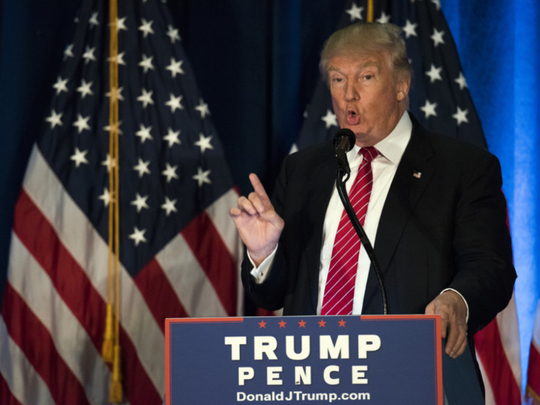
As Donald Trump’s poll numbers have dropped in recent weeks, bashing the “disgusting and corrupt” media has become the centrepiece of his campaign. “I’m not running against Crooked Hillary, I’m running against the crooked media,” he said at a rally in Fairfield, Connecticut over the weekend.
His campaign is indeed a place where journalistic objectivity meets its limits, but it’s not because we’re deliberately gunning for him. There simply is no fairness in presenting both sides of a story when one side is consistently rubbish, to put it kindly, or a dumpster fire, in this cycle’s parlance.
Trump changes his mind like it’s the weather and tells a lie every five minutes, going by Politico’s best count. Different outlets have handled Trump’s unique challenge in different ways, but generally it means working harder. CNN and MSNBC have taken to putting parentheticals in their chyrons to correct erroneous claims in real time.
The New York Times has started including the sweep of history in even the most straightforward news stories to demonstrate breaks from longstanding political norms. The fact-checkers in particular, are working overtime. The Associated Press and most major television networks have started fact-checking virtually every speech he gives, something they didn’t do in previous cycles. No fewer than 12 AP reporters were required to fact-check a single speech he gave earlier this summer, which they found to be “rife with distortion.”
Trump’s also been keeping Politifact busy. As of late June, 95 per cent of the site’s 158 fact-checks of Trump were rated “false” or “pants on fire,” while the same could be said for just 16 per cent of Hillary Clinton’s 120 rated statements. Even the typically staid Glenn Kessler, the Washington Post’s fact-checker, is at his wit’s end. He called one recent Trump comment, “among the stupidest claims made so far in this campaign.”
A comment like Kessler’s isn’t evidence of bias; it’s an example of telling it like it is. What’s actually biased is mindless he-said, she-said reporting — and to allow such reporting is to allow a bias in Trump’s favour, because so much of what he says isn’t true.
Of course, that hasn’t stopped Trump from — wait for it — lying about reporters. “You’ve seen it-the liberal media can’t stop telling outrageous lies about me,” he wrote in a recent fundraising email.
The flip side of Trump continually lambasting media outlets is that he also reads coverage obsessively, calling his campaign manager “several times a day” to discuss specific stories, according to the New York Times. The adulation of anything he deems to be flattering coverage is also quite possibly as unprecedented as all else in his campaign.
As he put it at a rally in Radford earlier this year, “about 80 per cent” of reporters are worse than the “sleazebags” he works with in politics. The political press, he added, is “the worst of all.”
By saying there are still a few non-sleazebag journalists, he’s left room for those who would tell the stories he wants told. Don’t trust the media, just the members of the media writing nice things about me, he seem to be saying.
What’s less straightforward is what Trump perceives to be flattering. Take, for instance, the story of Tony Schwartz. In 1985 then-New York magazine writer Schwartz wrote a piece describing Trump as — by Schwartz’s own recollection — “a ham-fisted thug who had unsuccessfully tried to evict rent-controlled and rent-stabilised tenants from a building that he had bought.”
To his surprise, Trump, who was then trying to burnish his tough-guy image, was so taken with the piece he hung it on his wall. Trump especially loved that “everybody seemed to have read it,” as he later gushed to Schwartz in a note on gold-embossed stationery. Soon after, he’d entice Schwartz to leave journalism and ghostwrite the myth-making book Art of the Deal.
Schwartz recounted all this in a New Yorker piece about how he regrets his role in creating the legend of Trump as a charmer and savvy businessman. He stated openly that he’d never forgive himself if Trump were elected president.
“I genuinely believe that if Trump wins and gets the nuclear codes there is an excellent possibility it will lead to the end of civilisation,” he wrote.
For journalists that story is more than good reading — it’s a cautionary tale: the moment we buy into Trump’s notions about what constitutes biased versus unbiased coverage, we buy into the logic of a master propagandist. Voters should understand that, too.
To have a low opinion of Trump’s suitability for higher office, to write critically about him regardless of how many journalistic outlets he blacklists in retaliation, is not a mark of bias, it’s a badge of honour. And journalists tellingly boast about it as such. Trump’s right that the media does not have a high opinion of his political fitness, but he’s wrong that that makes us corrupt.
Our low opinion is well-founded, undergirded by ample facts, historical evidence and morality. It means we’re doing our job, not his ghostwriter’s.
— Guardian News & Media Ltd
Lucia Graves is a Guardian US columnist. She was previously a staff correspondent for National Journal magazine and a staff reporter at Huffington Post.









